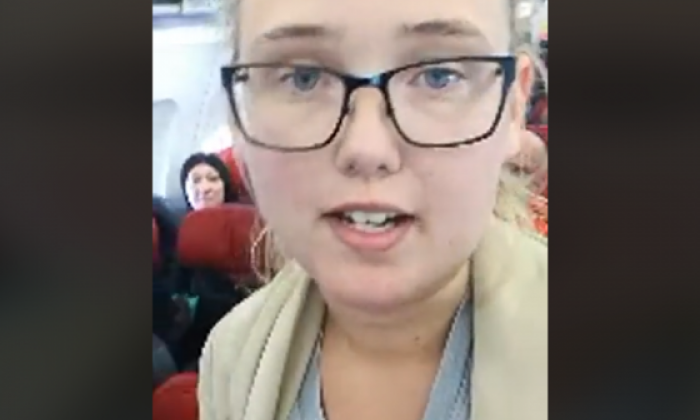Last Monday, Elin Ersson, a young Swedish student, boarded a plane at the airport in Gothenburg, Sweden, bound for Istanbul. The plane was crowded as its crew prepared to take off. Ersson stood up in the aisle, protesting that a fellow passenger, an Afghan refugee, was being deported. She was livestreaming as she spoke: “I’m not going to sit down until this person is off the plane, because he will most likely get killed if he is on this plane when it goes up.” The government officials accompanying the refugee tried to force her away from them. Turkish Airlines flight attendants tried to take her phone. But she persisted.
The tension on the plane, in her voice and on her face was palpable. “The pilot has the right to say that he is not allowed to be on the plane. And as long as he is not on the plane, then I will comply.” As she waited for the captain’s decision, she calmly continued her live narration. She was accosted by an angry man who grabbed her phone, which she recovered. “I am very sorry that a man is going to die and you are more worried about missing your flight,” she told him. When told that she was inconveniencing passengers, she replied, “But they’re not going to die; he’s going to die.”
In the background, a man’s voice can be heard explaining the situation to other passengers in Turkish. Suddenly the cabin is filled with applause. She panned her camera around to show that the cabin was now filled with people standing as well. Ersson’s eyes teared as she continued to describe the reasons for her protest. Word came that the refugee was being removed through a door at the back of the plane. Elin Ersson stood at the front door, refusing to disembark until she could confirm that the refugee was actually on the ground. The protest only took 15 minutes, but might have saved an asylum-seeker’s life.
The plight of migrants and refugees, in both Europe and the United States, has become one of the central controversies of our time. Wars, violence, climate change and growing global inequality are driving people to leave their home countries seeking safety. In Europe, most refugees come from Syria and Afghanistan. Violence in the Central American nations of El Salvador, Honduras and Guatemala are driving refugees north to the U.S. The journeys are long and dangerous.
Protests against the cruel anti-immigrant policies of President Donald Trump are diverse and fierce. From the airport protests against Trump’s “Muslim ban” in his first weeks in office, to vigils and sit-ins at the offices of Immigration and Customs Enforcement (ICE) facilities, to the halls of Congress, people have been putting their bodies on the line to oppose the ongoing persecution of migrants.
Opposition to harsh immigration policies is resonating in electoral politics. Alexandria Ocasio-Cortez, the Democratic candidate for Congress who upended the Democratic Party with her recent primary victory over a powerful incumbent, said in a recent interview with “Democracy Now!,” responding to Trump’s “zero tolerance” policy that separated nearly 3,000 children from their immigrant parents, “We need to occupy every airport, we need to occupy every border, we need to occupy every ICE office, until those kids are back with their parents, period.”
This week, the nattering nabobs of nativism over at Fox News got their comeuppance when they tried to book Ann Kirkpatrick, a Democratic congressional candidate in Arizona who is pro-ICE. They mistakenly booked a different candidate, from Massachusetts. She knew her airtime was limited:
“Good morning. I’m actually here to speak directly to Donald Trump. I feel that what’s happening at the border is wrong. I’m a mother of four, and I believe that separating kids from their parents is illegal and inhumane. I’m actually Barbara L’Italien, I’m a state senator representing a large immigrant community. I’m running for Congress in Massachusetts. I keep thinking about what we’re putting parents through, imagining how terrifying that must be for those families, imagining how it would feel not knowing if I’d ever see my kids again. We have to stop abducting children and ripping them from their parents’ arms, stop putting kids in cages, and stop making 3-year-olds defend themselves in court.” She was soon cut off by the befuddled co-hosts.
Creative protests and acts of solidarity, in concert with the determination and courage of the refugees themselves, are changing politics in the U.S and abroad. When Elin Ersson was reprimanded in the midst of her action, told that the Afghan man was being deported according to Swedish law, she replied, “I’m trying to change my country’s rules.” Rulebreakers, troublemakers dissenters: resistance is in the air.










